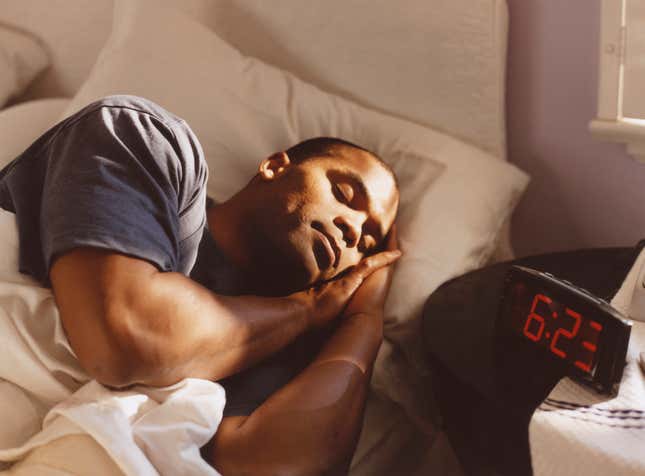
Growing up, my parents always stressed the importance of a good night’s sleep. When I was under their roof, my bedtime was consistent and non negotiable – that is, except for those rare occasions when I got out of line. Then, my ass got sent to bed even earlier.
Well, just like eating vegetables and doing my homework, it turns out Mom and Dad were right about sleep too. As the results of a new study suggest that the overall quality of your sleep can impact how long you live.
Researchers analyzed data from over 170,000 people who participated in the National Health Interview Survey between 2013 and 2018. The survey, conducted annually by the CDC and the National Center for Health Statistics as a check on the population’s health, includes questions about participants’ sleep habits. And what they found was that following these five healthy sleep habits can add almost five years to a man’s life expectancy and almost 2.5 years to a woman’s life.
Fall Asleep Easily
Forget dozing off to the television. When it’s time to go to sleep, you need to set yourself up for success. Things like making your bedroom cool and dark, limiting your consumption of caffeine and alcohol close to bed time, and unplugging from electronic devices at least 30 minutes before bedtime are some of the best ways to make sure you get to sleep fast, according to SleepFoundation.org.
Stay Asleep
And once you’re in dreamland, you want to stay there until it’s time to wake up again the next morning. That means, no tossing and turning or getting up to get a snack. According to the researchers, people with ideal sleep habits don’t have trouble staying asleep more than twice a week.
Get Your Time In
For adults ages 18 - 64, seven to nine hours of sleep is ideal. But keep in mind, that number can vary from person to person depending on factors like the nature of your job or any health issues you may have. If you’re depending on a bottomless cup of coffee to get you through the day, that should be a clue that you probably aren’t getting enough sleep at night.
Wake Up Well-Rested
People with the healthiest sleep habits wake up ready to face the day. Ok, so you may not be excited about the idea of going to work, but you shouldn’t have to drag yourself out of bed because of a poor night’s sleep. Researchers say the best sleepers wake up feeling rested at least five nights per week.
Just Say No to Medication
If you need to pop Unisom or Benadryl to get your ZZs every night, something is off with your sleep. According to researchers, those with healthy sleep habits without the use of sleep medication. But if you are using an aid to get to sleep, use caution. Even over-the-counter sleep medication can have side effects, according to the Cleveland Clinic.
Controlling for risk factors like lower income, smoking, alcohol use and other medical conditions, researchers found that participants with all five of these healthy sleep habits were 30 percent less likely to die of any cause, 21 percent less likely to die from heart disease, 19 percent less likely to die from cancer and 40 percent less likely to die of other causes. At this time, they haven’t been able to determine why men’s life expectancy increase was double that of women with the same sleep habits.
According to Dr. Frank Qian, a resident at Beth Israel Deaconess Medical Center in Boston, clinical fellow at Harvard Medical School, and one of the co-authors of the study, the results prove that the quality of your sleep is just as important as the quantity. “I think these findings emphasize that just getting enough hours of sleep isn’t sufficient. You really have to have restful sleep and not have much trouble falling and staying asleep,” he says.